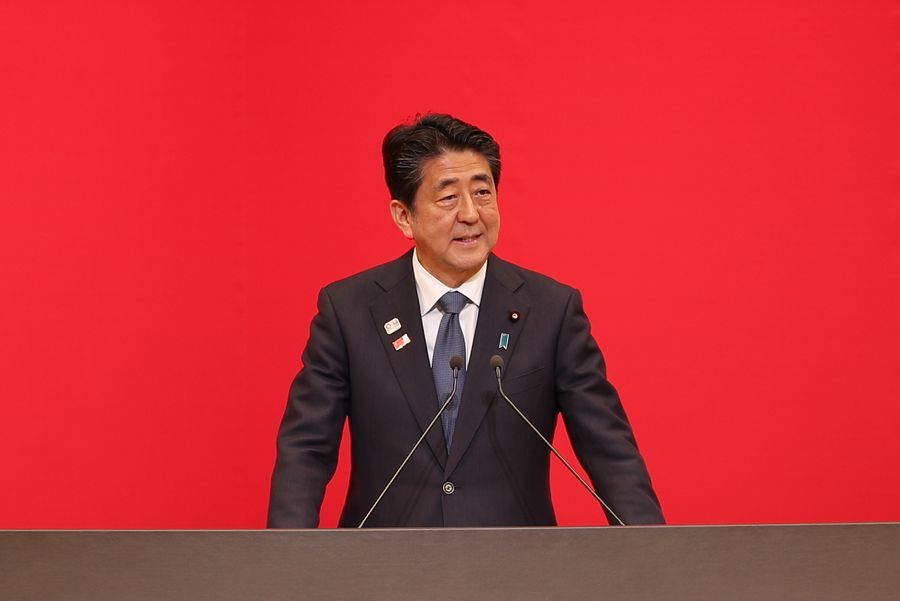
Photo taken on July 24, 2019, shows Japanese Prime Minister Shinzo Abe speaks at a ceremony in Tokyo, Japan. (Xinhua/Du Xiaoyi)
Japanese Prime Minister Shinzo Abe says he plans to meet S.Korean President Moon Jae-in on the sidelines of China-Japan-S.Korea leaders' meeting, and address the issues leading to the souring bilateral ties.
TOKYO, Dec. 23 (Xinhua) -- Japanese Prime Minister Shinzo Abe is expected to hold talks with South Korean President Moon Jae-in on the sidelines of a trilateral summit scheduled to be held on Tuesday in Chengdu, in China's southwest Sichuan province, government officials here said Monday.
On the fringes of the summit, the pair, who have not held formal talks in around 15 months, are expected to address the souring of ties between both countries that have hindered diplomatic and trade relations of late.
Abe said earlier in the day that cooperation between relevant parties remained important for regional security.
The Japanese leader also said he hoped to discuss issues of Japan's forced labor of Korean nationals during Japan's wartime occupation of the Korean Peninsula, an ongoing issue of contention between both nations that led to top courts in South Korea ordering some Japanese firms to pay compensation.
"The Japan-South Korea relationship remains in a severe state but it's important for Japan and South Korea, along with the United States, to work together under the current regional security environment," Abe said.
"As I plan to meet with President Moon, I will convey Japan's stance on the issue of former workers from the Korean Peninsula among others," he added.
Tokyo and Seoul have been at odds since October last year when South Korea's top court ordered a Japanese firm to pay compensation for the forced labor of Korean nationals during Japan's 1910-1945 colonial rule of the Korean Peninsula.
The Japanese side, however, has maintained that the highly controversial matter of it forcing its neighbor's citizens into hard labor during the war was settled by a 1965 pact, which saw Tokyo pay Seoul some 500 million U.S. dollars under the banner of "economic cooperation."
Senior officials from Japan and South Korea on Dec. 16 held talks on the bilateral trade dispute that has since ensued, with the director general-level dialogue coming ahead of Tuesday's planned meeting between Abe and Moon.
The talks in Tokyo were the first held between the two countries at this level since June 2016 and came as both sides look to address the bitter diplomatic row stemming from the wartime labor dispute, which has spilled over into trade and security areas.
As the dispute escalated, Japan, in July, tightened export controls on some high-tech products key to South Korea's semiconductor and display industries, claiming the move was owing to security issues.
The Japanese side also removed South Korea from its "white list" of preferential trade partners, dealing another blow to its neighbor.
South Korea hit back by removing Japan from its list of preferential trade partners, and, similarly tightened export controls on some of its products bound for Japan.
With the tit-for-tat trade spat leading to ties between the two countries sinking to the lowest level in decades, South Korea said in August it would cancel a key military intelligence-sharing pact with Japan, a move Tokyo strongly urged Seoul not to follow through with amid regional security concerns.
Just hours before the General Security of Military Information Agreement (GSOMIA) was set to expire, South Korea, on Nov. 22, announced it would temporarily suspend its termination of the agreement, as well as cancel a complaint it had made with the World Trade Organization against Japan's tightened export controls.
Amid signs of a possible thawing in diplomatic tensions recently, however, Japan's Minister of Economy, Trade and Industry Hiroshi Kajiyama said in early December that he hoped that through dialogue, cooperation between both sides on a number of issues could be stepped up.
The bureau chief level meeting held on Dec. 16 at Japan's trade ministry between Yoichi Iida, director general of the ministry's trade control department, and his South Korean counterpart Lee Ho Hyun, was held to pave the way for a continued thawing of ties and productive talks between Abe and Moon on Tuesday this week, officials here said.
In a possible sign ties may be improving between Japan and South Korea, Japan's trade ministry eased some export controls on South Korea-bound materials used in making semiconductors and display panels on Friday.■



